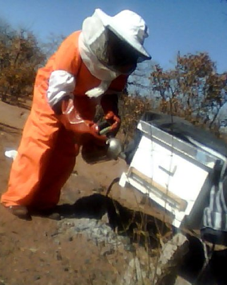To celebrate International Women’s Day we are profiling young entrepreneur Tshepiso Marumo, from Botswana, who has been keeping bees and producing honey based products since 2007. We find out about the challenges she has faced to get her business off the ground, and the tips she has for aspiring agriculture entrepreneurs.
This blog is part of an ongoing partnership with the Young Professionals for Agricultural Development (YPARD).
When Tshepiso began her beekeeping business in her spare time, while a university student studying for a management degree, her family was not convinced this was going to a viable career choice. Like many young people, she was encouraged to stick to her studies and get a white-collar job. But Tshepiso was undeterred. She enrolled in a beekeeping course run by the Ministry of Agriculture, and started saving her allowance and investing in the stock market to raise the capital to start-up her business.
“When I started, beekeeping was done by mostly old people,” she comments. “There was a gap in the market; honey was imported, we couldn’t meet the demand in Botswana”. This is why Tshepiso believed her business would be a success, and she was right; she now has twenty-one hives that hives produce up to 700 kg of honey annually. From liquid honey, to honey snacks, lip balm and candles, Tshepiso sells her products to supermarkets, clinics, hotels, restaurants, salons and individual consumers.
So what were the main challenges she faced, and how did she overcome them? “I had no land or funds in the beginning, I had to start to look for both,” she comments. But she learnt that being able to compile a good business plan, and show both landowners and banks how she intended to make profits through good bookkeeping and record taking, was very important. “They want to know about the profit. If you can’t share that with them, it’s a problem,” she says.
In terms of training people in agricultural skills, Tshepi thinks the Botswanan government does a good job. The reason people, especially the youth, are demotivated from starting up agricultural businesses, is because of the challenges they face, such as a changing climate, she says.
“We used to have so many bees, but because of climate change the number has reduced,” says Tshepiso. She is working to combat this problem by working with other beekeepers, rearing her own bees, and buying bees from Zambia.
“People train in agriculture but then they leave the jobs because of these many challenges”.
The number one piece of advice Tshepiso says she would give to any young entrepreneur who wants to follow in her footsteps is to find their own passion.
“Some people come to me and say, I want to do some business, but I don’t know what kind of business I can do, can you help me? Then I tell them, I can’t do it for you, whatever is in your mind, that is what you should do. If it is my idea, it won’t work for you. Plenty of challenges will come, and you will give up easily. But if it is an idea you have developed, something that you love, you can go ahead,” says Tshepiso.
More than anything, entrepreneurs need motivation, Tshepi believes. “People need to hear our stories and make them believe this can work for them.”
The future is bright for Tshepiso’s beekeeping business. She now has her eye on agro-tourism. “This is the focus now, so that we can have tourists, who can see what we do on the farm, and buy the products. I also want to educate the nation on how do beekeeping and how to make the products.”



